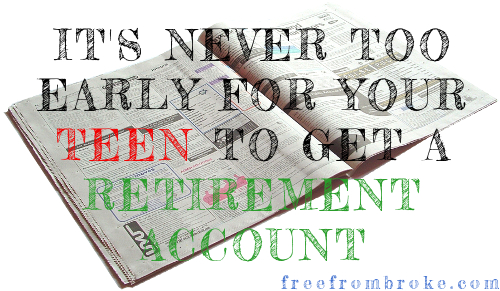Generally, retirement is something that middle aged individuals are concerned with, not teens.
Teens may feel like they have all the time in the world, while their parents hear the ticking countdown to retirement.
Parents can no longer change the fact that they probably didn’t contribute to their retirement at a young age, but they can help their children learn about retirement planning and contributing earlier rather than later.
This discussion can start with the teen’s first job.
There are Two Primary Ways Teens May Be Able to Start a Retirement Account:

Employer Based Retirement Accounts
If you’re the parent of a high school or college student, you know how many jobs they can go through in the few years that they’re in college.
There are the summer jobs, the work study jobs, the off campus jobs. . .It’s not unusual for a college student to have half a dozen or more jobs.
If you’re teen is lucky, he might snag a job that also requires him to contribute to his retirement fund.
When I was at a community college, I got a job as a tutor in the Writing Center. I only worked 5 to 10 hours a week, and I worked there for about 15 months before I transferred to a four year college. I didn’t really pay attention at the time, but the college took a portion of my income and automatically deposited it in a retirement fund for me.
When I left the job, they asked me what I wanted to do with the money I had accrued in the retirement account. (Keep in mind, this was over two decades ago, so the $130 to $150 that was there wasn’t an insubstantial amount to a broke college student.)
Like a dumb kid, I eagerly cashed it out and paid the penalties. I walked away with $114.
If your college student is lucky enough to land a job that has him contribute to retirement, try to dissuade him from doing what I did. Instead, convince him to leave that money there to multiple and grow over the many years he has until retirement.
If I had left the money there, untouched, assuming I had about $135 in the account, I would have $4,255 at my disposal if I waited to withdraw until age 70, even if I hadn’t added any more to the account. Simply leaving the money there and forgetting about it from age 19 to 70 would make my money multiple more than 31 times over.
NBC News recommends teens save for retirement while in high school. ” When first entering the work force, many college graduates focus on paying off their student loans. Starting retirement savings in their teens, even if they aren’t able to contribute for a number of years, at least puts some money to work early” (NBC News).
Is that enough to retire?
Of course not, but it does illustrate the power of compounding interest. To be honest, I have no idea what I did with the money when I cashed it out.
Imagine if your child left a few retirement accounts at her different jobs. She could have tens of thousands of dollars at retirement, just by leaving the money alone.
Open a Roth IRA for Your Child
If your teen doesn’t have a job that automatically contributes to his retirement, you can set up a Roth IRA for him if he’s under age 18. Not every brokerage offers this, but many do.
In any given year, you can’t put more than your child earns in the Roth IRA or more than the current Roth IRA limit, whichever is smaller. For instance, if your child makes $2,300 during the year, that’s the maximum she’s allowed to contribute.
Still, let’s say your child puts $1,000 in a Roth IRA during each year of high school and never contributes again. By age 70, she would have $134,901.39 assuming a 7% rate of return. She makes nearly 34 times more than her contribution of $4,000 just by investing at an early age and letting the money sit. (Of course these numbers depend on market factors over time and where the money is invested, but you get the idea of the power of compounding).
Final Word On Teen Jobs and Retirement
Trying to convince your high school or college student to keep money in a retirement account if their employer does so or to fund a Roth IRA may be a hard sell. You can make it easier on them by offering to pay them the amount they would get if they withdraw the money from an employer IRA or to match the amount that they put into a Roth IRA.
Building up their retirement accounts at such an early age is an incredible gift for a child or young adult.
Your child may balk initially, but chances are she’ll be very grateful in just a few years.
I say if you have the option to, then why not? The earlier the better in my opinion. I made a similar mistake when I was working in college and cashed out the little 401k I had. It wasn’t much, but would not do it again. We plan on “hiring” our daughter for our business next year and will likely just put her money in a Roth for her.
That’s an awesome plan. I want to do the same with my kids.
Hiring your kid is a great plan. I’ll keep that in mind. I’m planning to match his contribution to the Roth IRA when he starts working. We’ll see if that work.